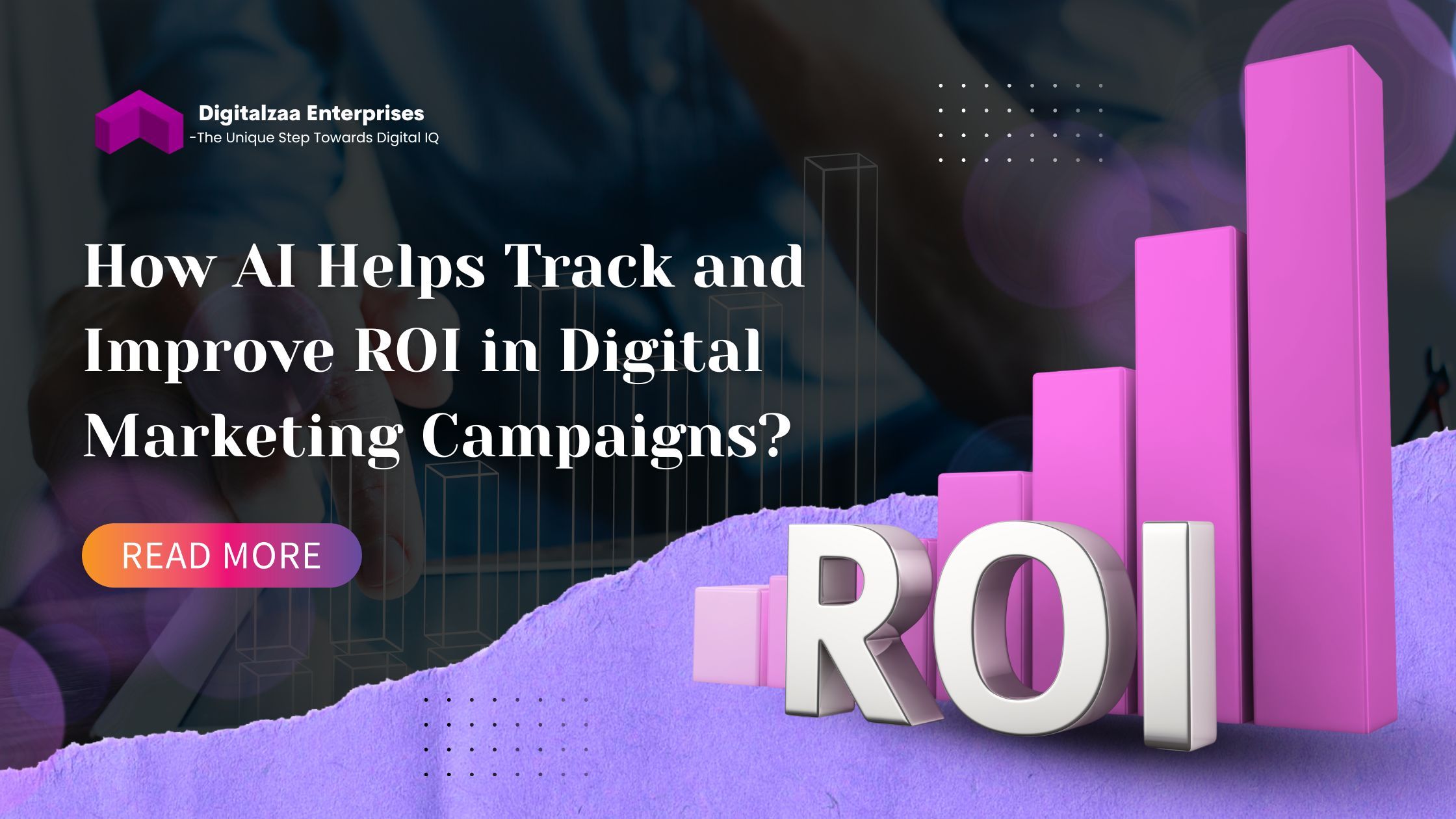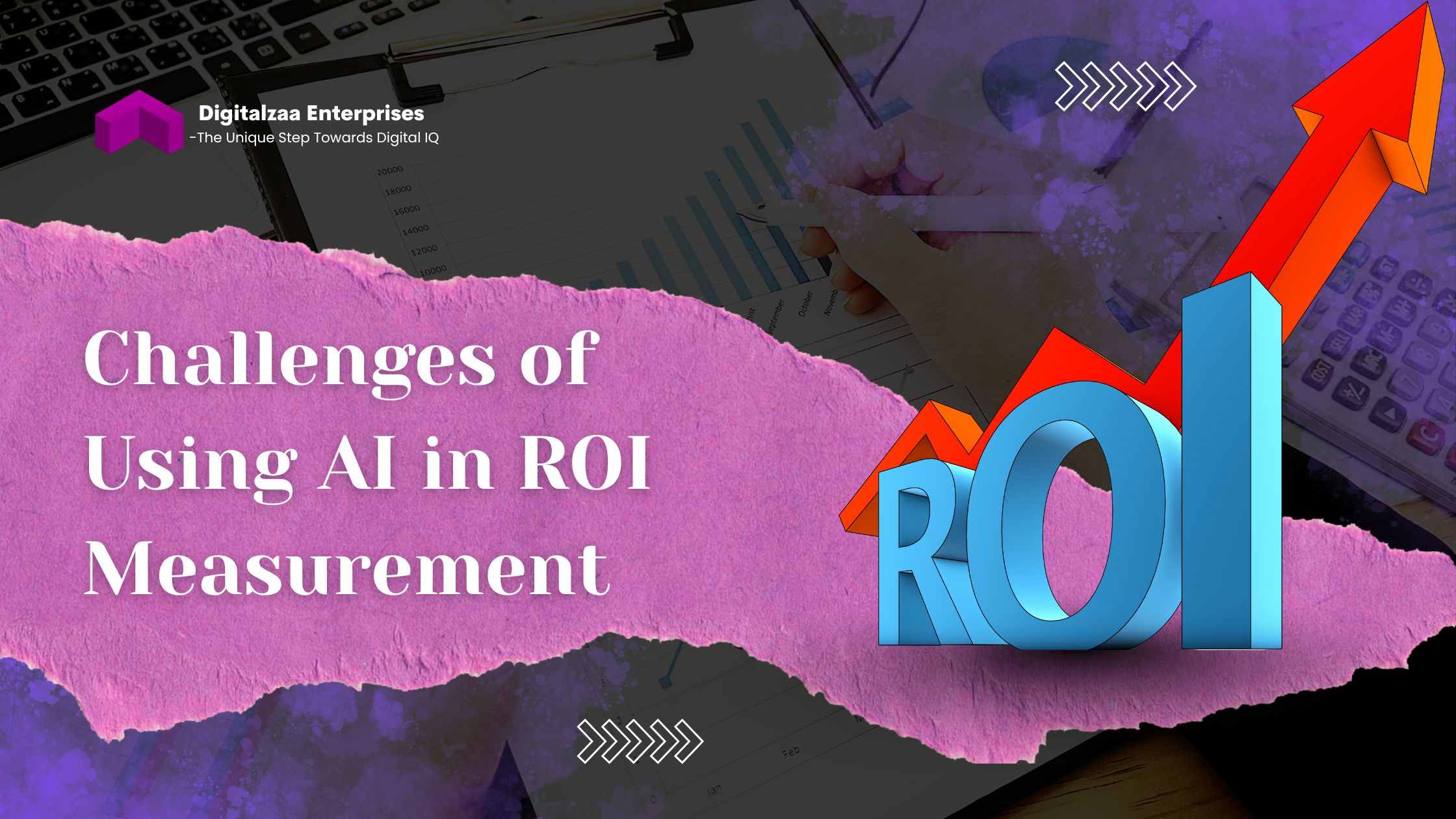How AI Helps Track and Improve ROI in Digital Marketing Campaigns?

In today’s highly competitive online landscape, businesses face immense pressure to prove that every marketing dollar spent drives measurable results. Tracking and improving ROI (Return on Investment) has always been one of the toughest challenges for marketers. With the rise of AI in Digital Marketing, this scenario has changed dramatically. Artificial Intelligence empowers businesses to not only monitor performance metrics in real-time but also optimize campaigns automatically for better conversions and engagement.
AI has become a game-changer in marketing analytics by transforming data into actionable insights. From predicting customer behavior to optimizing ad spend, Artificial Intelligence in Marketing has redefined how ROI is tracked and improved. Let’s explore how AI is reshaping marketing performance measurement and why adopting it is crucial for every brand aiming to stay competitive.
ROI in Digital Marketing
ROI in digital marketing represents the value a business gains from its marketing efforts relative to the amount invested. Traditionally, calculating ROI involved simple equations like:
ROI = (Net Profit / Total Marketing Cost) × 100
However, digital marketing campaigns today run across multiple platforms — social media, Google Ads, email, websites, and more. Tracking the impact of each channel, audience segment, and campaign element requires advanced tools. That’s where AI Tools for Marketing ROI play an essential role.
AI simplifies this complexity by integrating data from various sources and providing a unified view of campaign effectiveness. It not only tracks ROI but also identifies where improvements can be made for maximum impact.
The Role of AI in Digital Marketing
AI in Digital Marketing is more than just automation — it’s about intelligent decision-making. Artificial Intelligence can process massive datasets, uncover hidden trends, and make predictions faster and more accurately than humans. Here’s how AI is integrated into modern marketing ecosystems:
- Customer segmentation: AI groups customers based on behavior, demographics, and purchasing intent.
- Predictive analytics: It forecasts which campaigns will generate the highest engagement or sales.
- Automated content optimization: AI helps marketers create and deliver personalized messages to the right audience at the right time.
- Real-time insights: Marketers can monitor ROI instantly and adjust strategies accordingly.
AI-driven marketing analytics has turned the once time-consuming process of performance tracking into an intelligent and proactive system.
How AI Helps Track ROI in Marketing Campaigns
1. Data Integration and Centralized Analytics
Marketers often struggle with scattered data from multiple platforms — Facebook Ads, Google Analytics, CRM software, and email campaigns. AI tools consolidate this data into a single dashboard. Using Marketing Analytics with AI, businesses can get a 360-degree view of campaign performance, making it easier to measure ROI across all touchpoints.
2 Predictive Analytics for Smarter Decision-Making
Predictive analytics is one of the most powerful features of Artificial Intelligence in Marketing. By analyzing past data, AI can forecast future outcomes — for instance, which ads will yield the best conversion rate or which customer segments are most likely to purchase.
This forecasting ability enables marketers to allocate budgets effectively, maximizing ROI by investing in high-performing areas. Predictive models also alert marketers to campaigns that might underperform, allowing them to make timely adjustments.
3. Real-Time Campaign Optimization
Traditional analytics tools only measure what happened in the past. In contrast, AI enables real-time monitoring and optimization of campaigns. When AI detects poor engagement or low conversion rates, it can automatically adjust targeting, bidding strategies, or ad creatives to improve performance.
This means businesses no longer have to wait until the end of a campaign to see if it was successful — AI in Digital Marketing ensures constant improvement and adaptation, leading to higher ROI over time.
4. Customer Behavior and Sentiment Analysis
Understanding customer behavior is essential for improving marketing ROI. AI tools use machine learning and natural language processing (NLP) to analyze customer feedback, reviews, and social media conversations. This Marketing Analytics with AI approach helps marketers understand audience emotions, preferences, and purchasing triggers.
By tracking sentiment, brands can refine their messaging and content strategy. For instance, if a campaign’s tone isn’t resonating well with the audience, AI can detect this early and suggest adjustments to maintain engagement.
5. Automating Repetitive Marketing Tasks
Many marketing activities, like reporting, data entry, and performance tracking, consume valuable time. AI automation tools handle these repetitive tasks, freeing marketers to focus on strategy and creativity. Tools like Hootsuite Insights, Marketo, and Sprout Social use AI to automate reporting and provide detailed ROI metrics.
This automation not only saves time but also enhances accuracy, ensuring that businesses have up-to-date information to make strategic decisions.

How AI Improves ROI in Digital Marketing
1 Enhanced Targeting and Personalization
Personalization drives engagement, and engagement drives ROI. AI-powered algorithms can analyze user data to create personalized experiences at scale. Whether it’s suggesting the right products, sending tailored emails, or customizing ad creatives, Artificial Intelligence in Marketing ensures each interaction feels personal and relevant.
For instance, AI can segment audiences into micro-groups and deliver customized ads, leading to higher click-through rates and conversions — directly boosting ROI.
2. Smart Budget Allocation
One of the biggest challenges marketers face is allocating budgets efficiently. With AI Tools for Marketing ROI, businesses can analyze which campaigns, channels, or audiences deliver the highest returns. AI systems continuously learn from performance data, recommending budget reallocation to the most profitable strategies.
This level of optimization ensures every dollar is spent wisely, improving ROI with minimal human intervention.
3. Content Optimization and A/B Testing
AI automates A/B testing by simultaneously running multiple variations of ads or web pages and determining which one performs best. It analyzes engagement patterns and recommends changes — from image selection to CTA placement — that lead to better conversions.
In essence, AI in Digital Marketing turns content testing from a manual process into a continuous optimization cycle, ensuring higher ROI with each iteration.
4. Conversion Rate Optimization (CRO)
AI helps identify exactly where potential customers drop off in their journey. Using heatmaps, behavioral data, and predictive models, AI provides actionable insights to improve landing pages, ads, or checkout flows.
For instance, if AI detects that users abandon their carts frequently, it might suggest simplifying the checkout process or adding incentives like discounts. Such improvements lead to better conversion rates and, therefore, a higher ROI.
5. Advanced Performance Forecasting
Using historical data and ongoing analytics, AI systems can predict future marketing performance with remarkable accuracy. They can forecast metrics such as expected clicks, conversions, and engagement rates before the campaign even starts.
This proactive approach allows marketers to fine-tune campaigns ahead of time, setting realistic goals and preventing wasted resources — a direct contributor to higher marketing ROI.
Popular AI Tools for Tracking and Improving Marketing ROI
Here are some powerful AI Tools for Marketing ROI that businesses widely use:
- Google Analytics 4 (GA4): Offers AI-powered insights, anomaly detection, and predictive analytics.
- HubSpot Marketing Hub: Uses machine learning to track performance and automate campaign optimization.
- Adobe Sensei: Integrates AI into content creation, personalization, and analytics.
- Hootsuite Insights: Provides sentiment analysis and social ROI tracking powered by AI.
- Salesforce Einstein: Analyzes multi-channel campaign performance and predicts future ROI trends.
These tools represent how Marketing Analytics with AI simplifies complex performance tracking into actionable insights.
Case Study Example: AI Improving ROI in Real Life
Let’s take an example of a global e-commerce brand that integrated AI in Digital Marketing through Google Ads Smart Bidding. Before using AI, their ad campaigns were manually optimized, resulting in inconsistent performance.
After adopting AI-powered optimization, the platform analyzed millions of data points in real time — user device type, location, time of day, and behavior. Within three months, the company reported:
- A 28% increase in conversions,
- A 15% reduction in cost per acquisition (CPA), and
- A 25% improvement in overall ROI.
This case highlights how Artificial Intelligence in Marketing provides measurable advantages by continuously learning and optimizing campaign performance.

Challenges of Using AI in ROI Measurement
While the benefits are significant, businesses must also consider the challenges of adopting AI for ROI tracking:
- Data Quality Issues: AI depends heavily on accurate data. Poor data quality leads to incorrect predictions.
- Integration Complexity: Combining multiple data sources into AI systems can be technically challenging.
- High Initial Costs: Advanced AI platforms can be expensive for small businesses.
- Lack of Human Oversight: Relying entirely on automation can sometimes miss creative or emotional elements in campaigns.
Despite these challenges, the long-term gains in efficiency, accuracy, and profitability make AI adoption highly worthwhile.
The Future of ROI Tracking with AI
The future of AI in Digital Marketing looks even more promising. With the rise of generative AI, marketers can expect smarter insights, fully automated reporting, and predictive recommendations that continually evolve with customer behavior.
Future advancements will include:
- AI-powered ROI forecasting dashboards for real-time optimization.
- Integration with IoT and AR/VR marketing analytics for cross-platform performance tracking.
- Voice and visual search analytics to measure ROI beyond traditional text-based searches.
As AI continues to evolve, the accuracy and speed of ROI tracking will reach new heights, helping businesses make data-driven decisions faster than ever.
Conclusion
In the modern marketing world, measuring ROI isn’t just about calculating profit — it’s about understanding performance at every stage of the customer journey. AI in Digital Marketing empowers businesses with the tools to track, analyze, and optimize campaigns in real time. From data integration to predictive analytics and automated optimization, AI brings intelligence and precision to every marketing activity.
By leveraging Artificial Intelligence in Marketing, brands can uncover insights that were once invisible, make smarter decisions, and achieve higher returns on every investment. Whether through AI Tools for Marketing ROI or Marketing Analytics with AI, the message is clear — AI isn’t just transforming how we market; it’s redefining how we measure success.
As digital competition intensifies, those who embrace AI-driven strategies will not only track ROI more effectively but also continuously improve it — staying well ahead in the race for digital dominance.


